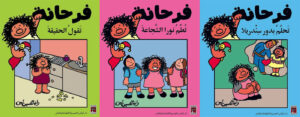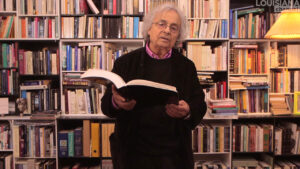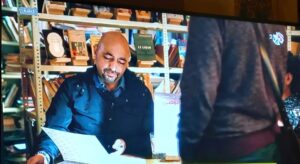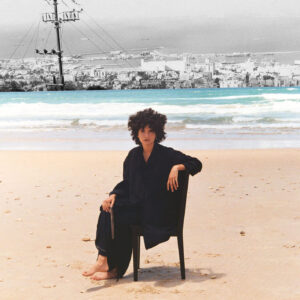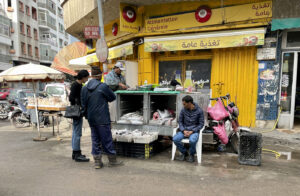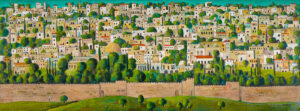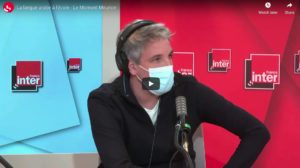Between university budget cuts, the challenges of remote learning and reduced attention spans, book bans, and fear itself, education in the United States is facing a mounting crisis.
Let me make clear at the outset that the title of this commentary is an exaggeration — Arabic is not going anywhere; it will continue to be spoken by more than 100 million native speakers and millions more who have learned the language for religious study or travel. But in the United States, the number of university programs and departments offering Arabic and Middle East studies, or “area studies,” are on the decline. Could it be that, more than 20 years after 9/11, the frenzy of the State Department and academia to meet the demand has finally waned?
No — it’s all about economics, not optics.
The other day the New York Times followed the story of West Virginia University shuttering its entire world languages, literature and linguistics department. I had caught wind of this cataclysm only a few days earlier, in a tweet by poet and translator Huda Fakhreddine, who was circulating a petition designed “to reverse this dangerous decision.”
West Virginia University is eliminating its department of World Languages, Literatures, and Linguistics! Sign and circulate this petition calling on WVU administration to reverse this dangerous decision. https://t.co/UOMJUbps5B
— Huda Fakhreddine | هدى فخر الدين (@FakhreddineHuda) August 13, 2023
Looking into the matter further, I soon discovered that it is not only foreign languages that are on the wane; nationally, college degrees in English are down by nearly 30%, going from 63,914 graduates in 1971 to 40,002 in 2018.
The Times story noted that, “The number of bachelor’s degrees in world languages, literature and linguistics awarded annually fell by 25 percent nationally.” Part of the problem is that many universities are operating at a budget deficit in the many millions of dollars. As the Times reported, the University of Pennsylvania, for instance, faces a $63 million budget deficit in 2023.
I reached Huda Fakhreddine, who happens to be an Associate Professor of Arabic Literature at U Penn.
“All of us in the humanities feel threatened but especially those of us on the margins of the humanities, in area studies which, as you know, is where American institutions place other cultures and languages. Here at Penn, the decline in enrollments is always brought up as a warning or a threat. Also, early last year our Middle East Center lost its federal funding. Various reasons were cited, but overall, it did feel like an attack on our relevance and existence at the institution.”
I asked Ammiel Alcalay, who has taught courses on Middle Eastern and Mediterranean literacy and intellectual culture at the City University of New York and Queens College since the ‘90s, if he had observed a drop in interest in area studies, including foreign languages and literature over the past few years, and whether he thought intellectual discourse was as vibrant today as it had been in the late ‘90s and early 2000s.
“Of course there’s been a drop in interest, but there’s also a drop in interest in everything,” Alcalay noted. Without exaggeration, the poet, translator and author of the classic study After Jews and Arabs: Remaking Levantine Culture really sounded the alarm bells.
“Younger people are desperate, suicidal, see very few options for themselves, so the idea of getting excited about studying a language or another culture is really far afield. I would attribute this to the complete corporate woke culture of US academia and the effect of the lockdowns. Universities may have been some of the worst perpetrators of utterly insane policies that treated students (and everyone else) like cattle, in order to transform them into sheep. The stats for the rise in administrative positions versus enrollment is enormous, and most of those positions are in the ‘DEI’ realm (diversity, equity, inclusion).
“At the same time, the rest of the world is truly shut out airtight. In the US, no mainstream media outlets report anything outside the US unless it’s directly part of US policy (i.e. support for the war in Ukraine, but is there any actual journalism on it? analysis? nyet). There aren’t even images, or anything to pique the imagination. So, for all intents and purposes, the rest of the world doesn’t exist, other languages don’t exist. It’s all being flattened to the small digital screen and the very limited feeds that most people have become accustomed to.”
Alcalay argues that the bottom has dropped out. “The decimation of the curriculum goes across the board, starting in kindergarten, so things are not going to improve,” he declared. “Sorry to be so dire, but I’m feeling it.”
Mehnaz Afridi, a professor of religious studies at Manhattan college, concurred. Replying to an email query, she wrote: “I think humanities are in trouble around the nation. There are new laws in certain states that are not allowing educators to discuss race, sex, and colonial history. Budget cuts are due to mismanagement but the first programs that are being cut are in the Liberal Arts.”
Echoing these concerns, Huda Fakhreddine added, “It seems as if we, in area studies, regardless of our expertise and disciplines, exist to serve other agendas and interests. We are easily dispensable when these interests shift.”
By the way, WVA isn’t only killing foreign languages, notably its Arabic and Mandarin studies — it’s also ending creative writing courses.
The Post-Pandemic World
Some of the people you talk to about this crisis say we’re in the “post-pandemic world,” as if that conveniently explains the continuous decline of knowledge, when capitalism in the time of the internet and the smart phone has been leading us down this path for decades. Earlier this month, writing in their Substack, in “The Battle to Save Public Education,” Dan Rather and Elliot Kirschner argued:
The pandemic wreaked havoc with the emotional, intellectual, and social development of America’s youth. Dismal test scores provide depressing data of yawning learning deficits. Talk to anyone in or around schools and you hear stories of setbacks and struggle — heaps of qualitative data suggesting a staggering scale of generational loss.
Not to come across as shrill, but we may truly be talking about a “lost generation” across the spectrum, from elementary school kids to college students. With attention spans shrinking, with fewer young people talking to each other (they prefer WhatsApp texts and the online chat option Discord to real conversation), the opportunity for face to face debate is greatly diminished.
“The digital business is a huge problem, [as we see] the flattening out of everything and the destruction of a real attention span,” Alcalay commented. “I don’t have a smart phone and am not on any social media, yet I still have had to really discipline myself to get back to reading [books] for hours on end,” he added. “The problem is not just academia but big tech [and] government censorship, as exposed in the Twitter Files and by Matt Taibbi, Michael Shellenberger and other actual journalists, as well as in congressional hearings.”
Alcalay added that today’s screen culture is a huge problem, not only because it challenges our attention spans, but because it augurs “the destruction of journalism, investigative reporting, and actual debate.” (If you’re reading this online in The Markaz Review, thank you for indulging the irony.)
Meanwhile, an August 16th story in the Nation, on “The Evisceration of a Public University,” found that, “The book bans, censorship, purges of area studies programs, and targeting of academics at public institutions (particularly in the South) are all calculated to decrease the public’s confidence in public education so that it can be dismantled and replaced with private corporations, which lack regulation and oversight.”
The future of higher education looks bleak. Money will flow to elites in private schools, who will benefit from comprehensive language instruction, liberal arts, inclusive critical thinking skills, and a global curriculum, and thus have access to global careers in the arts, finance, diplomacy, national security, international business, international law, AI, and other fields. Students at state schools will receive the education that the oligarchs want them to, based on their largesse.
And we haven’t begun to scratch the surface of the damage being done by recent book bans and other forms of censorship. A PEN America report dated August 23rd on “Educational Intimidation” found that, “Fear is the new watchword in public education. Across the country, teachers, librarians, and school administrators are attesting to a chilled climate, in which they are more concerned with running afoul of new censorious laws than with educating their students.”
Thus, in the United States, intellectuals and academics are fighting battles on multiple fronts, from shrinking budgets for area studies and educational intimidation, to shrinking attention spans. Lest you think this is only a North American problem, foreign language study is on the decline in the UK as well. A Guardian story 10 years ago sounded the alarm and a 2020 report by the British Council found that Brexit had spurred a negative trend in language learning in UK schools. It quoted the British Academy statement, “Monolingualism is the illiteracy of the 21st century.”
It’s worth noting that the decline of Arabic and Middle East Studies in the United States parallels the waning of US influence in the region, as Chas Freeman recently pointed out in “The Middle East is Once Again West Asia.” Arab countries, Iran, and Turkey among others, Freeman wrote, “are in active pursuit of strategic autonomy through diversification away from political and economic overdependence on the United States.”
Even though whole foreign language departments are threatened with extinction, US employers are still looking for people who can speak a language other than English. Demand for bilingual staff is on the rise, according to a report from the New American Economy. In fact, demand for bilingual talent rose by 14% between 2016 and 2019 alone, and in the UK in 2020, according to the same source, 75% of employers valued foreign language skills.
So don’t delete your Babel or Duolingo app just yet. Hang on to your hope that you can acquire a second or third language, because you may need it. Besides, reading literature in another language takes you to a whole new level of human understanding. They say it even increases your emotional IQ and makes you more of an empath.
How’s your Arabic?
















